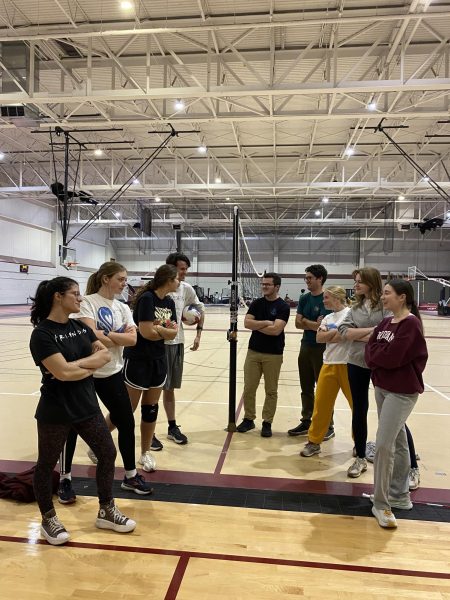The Age-Old Mantra: Control the Controllables

In a time of such uncertainty, athletes can only focus on what is in their control as they await to return to the playing surface again. (Courtesy of Fordham Athletics)
It’s hard to be in the zone with so many unknowns. Even beyond coronavirus, just take a moment and imagine everything you have to consider when playing a sport. In softball, not only do we have to worry about a ball coming at us, we have to calculate the trajectory of said ball, guess and track where it might be going and figure out what we’ll do when we get to it. You might take into account the opponent’s strengths and weaknesses, the weather, the umpire and so much more. This can throw you into a limitless whirlpool of doubt that activates your flight or fight instincts. The best moments — in life — come when we clear our mind of everything we think we should know and lead our body with confidence and without second-guessing. Now expand your imagination beyond the softball diamond, soccer pitch, basketball court, pool or whatever other sport location that comes to mind when thinking about overthinking. To get wrapped up in the number of positive cases, the many things or people you love that have been compromised by COVID-19 or any other pesky unpredictables regarding this unprecedented pandemic is to voluntarily jump into that incessant abyss of uncertainty.
Over this previous winter break, my amazing and encouraging teammate Rachel Leah Hubertus, social media and communications intern for T.E.A.M. Fordham, volunteered me to teach yoga classes to student-athletes every couple of weeks. Although I am uncertified and only somewhat experienced, I set forth on my journey of research. I noticed the importance of focus for these relaxing half-hour sessions. Not only being focused on the movements but having a focus, to begin with. Whether to stretch, relax or clear my mind, it was important to set an intention and steer myself back if I lost track of it. On a relatively microscopic level, a word kept appearing in whatever video I watched or article I read: Drishti. When doing a balancing pose or any movement, my online teachers reminded me of the importance of this word.
Meaning “a focused gaze,” Drishti binds the fifth and sixth “limbs” of yoga: withdrawal and concentration, respectively. This middle ground allows you to be present in the moment, focus on something and therefore not think about anything. Dialing in on a certain stain on the ground or letter on my yoga mat, I could more easily hold myself up in crow pose or stabilize my high lunge. Drishti is something to tap into that focuses your practice and attention, and it’s a skill I learned to return to throughout the entire session.
Coming back after a longer than normal winter break, the concept of a focus point continuously returned and challenged me. Upon returning, softball, school, work, finances, friendships and so many other things were on my mind. It’s overwhelming to have so much on my plate, even though it’s also gratifying. At practice, a list of things I wanted to work on ran through my mind like the opening scroll of “Star Wars.” Back at my dorm, I worried about my family back home, myto-do list and what I was going to do tomorrow. Then, learning about the university’s two-week shutdown, the stress of COVID-19 weighed on top of me in addition to everything else. With our schedule pushed back, the focus of our first game was gone from my mind.
However, we knew these hardships would happen. Heading into the semester, our coaches and captains reminded us of living day-to-day and throwing expectations for tomorrow out the window. The typically rigid schedule we hold became a little more flexible, and it was hard not to think about everything that was not guaranteed: when and who we would play, where we would play, who would play and the list goes on.
Furthermore, when we are practicing, all sports psychologists steer us on the path of controlling what we can control — namely attitude, preparation and effort. This gives us the opportunity to be in the zone, free from the constraints of over analyzing.
After a week without practicing with my team, lifting in a gym or even hitting a softball, I am again reminded of Drishti. This time, my focus point is not on a stain in front of me or even an intention, but a concept that is both easy to find and lose: gratitude. With a focus on abundance, the mind, body and soul relax and strengthen, confident that we’re on the right path. If uncertainty is like movie credits, then the billions of things to be grateful for are like the night sky. Shining, infinite, brilliant stars that stand out against the great unknown might not be as bright one day, but we always know that they are there. We can point to some, gasping and awing at their beauty, and know that we can go an entire lifetime without naming them all. At this moment, a purgatory between not playing and playing, I am grateful for the opportunity to even anticipate a game soon, to breathe, to have so many amazing people around me. I could keep going, but that would take forever.











































































































































































































